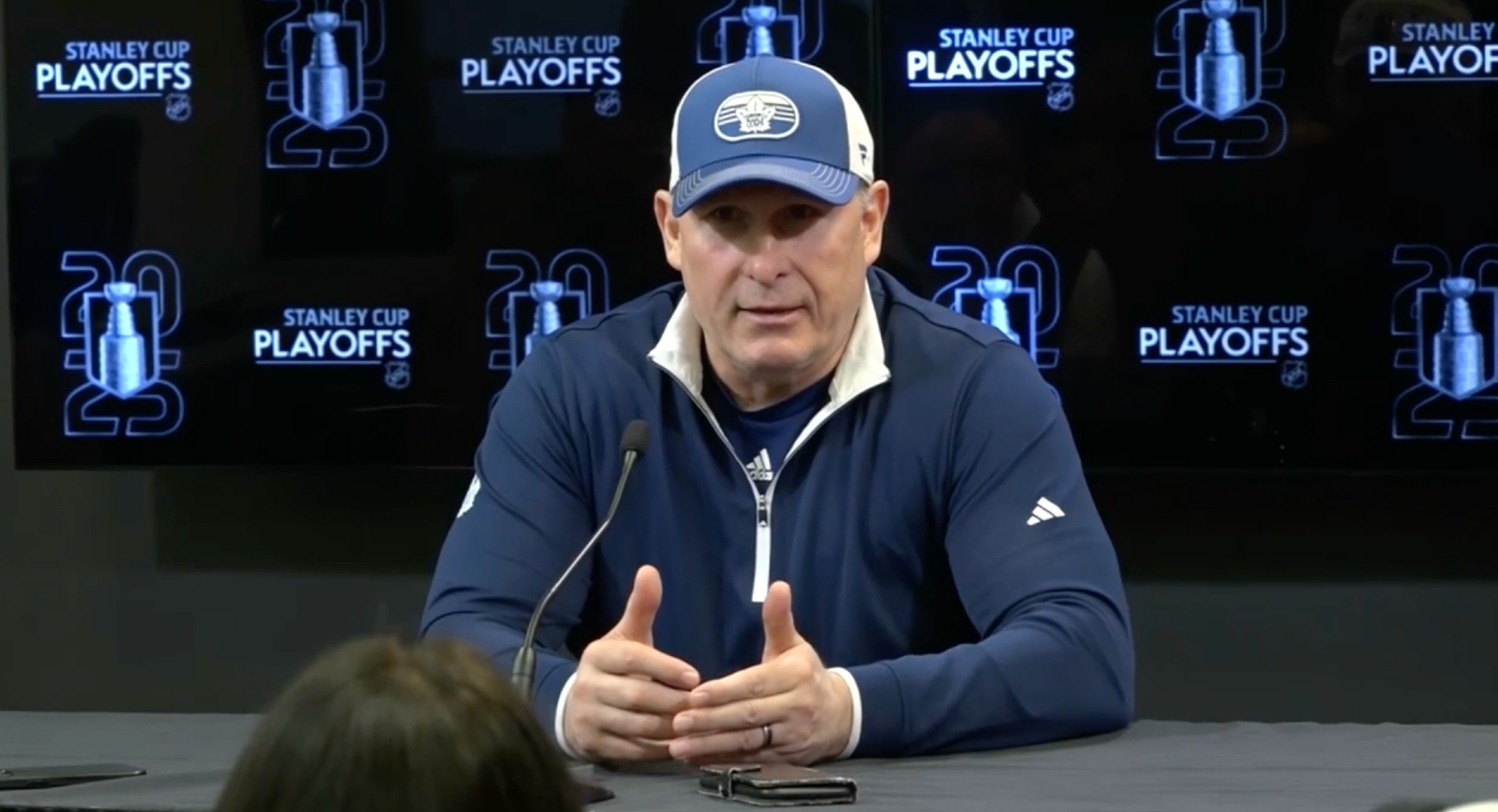Ahead of Game 4, head coach Craig Berube discussed the team’s opportunity to eliminate the Senators, Scott Laughton and Matthew Knies’ impact on the series, and his belief in the style of play needed to succeed in the playoffs.
Morning Skate Lines – Game 4
Lines at Leafs skate
Knies – Matthews – Marner
Holmberg – Tavares – Nylander
Jarnkrok – Laughton – Lorentz
McMann – Domi – Pacioretty
Robertson, KampfMcCabe – Tanev
Rielly – Carlo
Benoit – Ekman-Larsson
Mermis – MyersStolarz starts
WollG4 tonight@TSN_Sports
— Mark Masters (@markhmasters) April 26, 2025
How do you approach an elimination game?
Berube: I don’t think there is a different approach. Each individual on the team needs to focus on their shift, what they need to do, and the process of it all. They are going to push hard, as they have every game. That is no different for me tonight.
We just have to focus on what we need to do. For each individual, it is your battles and your puck management. Just keep playing how you’ve been playing.
Has the mood of the team changed at all from before Game 1 to now?
Berube: I don’t believe it has. The mood has been good. It’s normal for me. It’s business-like. It’s maybe a little more eager today, but for the most part, it is business-like.
What are the lessons to be learned from Simon Benoit’s path for a young player trying to make his way?
Berube: There are a lot of guys who mature at a later age in their game with their development. They grow as players and get better. There have been a number of those guys over the years who have gotten better and better throughout their careers as they go along.
Guys work on their game so much nowadays that there is improvement all the time. In the summertime, they have skills coaches and work on all kinds of things. They improve. Benny is one of those guys.
He has always been a hard defender and a big guy. He plays a heavy game. It seems like he has grown this year with his puck play. He is more confident.
When you look at the minutes the defense is playing, there is not a big gap in the ice-time distribution. How has that materialized?
Berube: In playoff hockey, you need everybody, right? You keep guys fresh, and there is more energy. We use all our players. We use all of our D. They have been good for us. We have a good combination with the pairs and how they work. That is why you see a lot of the minutes staying pretty equal out there.
What have you liked about Scott Laughton’s game throughout the playoffs?
Berube: Gamesmanship, for sure. He is really good in the faceoff circle. On the checking side of things, he is understanding his role with the d-zone faceoffs and penalty kill. They are out there against different lines. A lot of the time, there are matchups and d-zone faceoffs. He has been solid in all of those areas.
What allows Laughton to have so much success in the faceoffs?
Berube: Competitiveness. There are guys who are really good at faceoffs who study who they are going against. That is part of it all, but if you compete hard and want to win the draw, a lot of the time, you will win the draw.
Travis Green has mentioned how difficult the screening in front of Linus Ullmark has been to deal with. What does it say about the impact Matthew Knies is making?
Berube: That is maybe the biggest part of his game: the net front. Throughout the season, he has scored most of his goals 10 feet in around the net or even closer. That is his game.
Whether it is power play or five-on-five, playing with Mitch and Matty, he knows that when they get the puck, it is going to get there eventually. He does a good job of getting there and wanting to be there. That is where he gets his goals, all around the net.
He has done an excellent job of it, but it is the understanding and willingness to want to do it. That’s on him. He has bought into that.
You know Claude Giroux pretty well. How surprised are you that he and Laughton have singled each other out in some of the scrums?
Berube: They played together, right? I am sure they are good friends, which I know they were, but playoff hockey changes. You try to do what you can to disrupt the other team or do whatever you have to do. It changes.
What is the key to staying on the right side of the discipline factor?
Berube: You have to understand not to react to the scrums and all of that. Play hard between the whistles. I get that there are desperation plays sometimes, and you take penalties. That is going to happen in the game. It is the other stuff that you have to be really good at it — having composure and initiating as much as you can.
I don’t have an answer for it. It is just the understanding of it.
With the style of play you want to see the team play, how did you come to the conclusion that this is the right kind of hockey that will succeed in the playoffs?
Berube: I coached under [Ken Hitchcock] for a long time, Hitch and Johnny Stevens. I started in Philly, and that is sort of how we played. I have always liked that style: the aggressive forechecking style and checking style of hockey.
If you look at playoff hockey overall, in the end, you have to forecheck. You have to be a heavy team in the playoffs. But you can’t just suddenly change when the playoffs start. We are not the Edmonton Oilers of the 1980s here. They could do it, and they did a good job of it. We had to work on it all year. You have to create that identity.
Did you consider Ken Hitchcock to be your coaching mentor?
Berube: He is definitely one of them. I was around him a lot in junior hockey onward.
John Stevens was the first head coach I worked under and learned a ton from in terms of how he ran things. He was very successful at it. He won AHL championships, and he has won NHL championships as an assistant. He’s a very good coach.

































